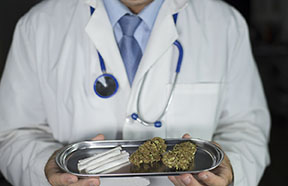

Marijuana, Workers' Compensation and the Workplace
How does the use of marijuana affect workers' compensation benefits?
There are several workers' compensation issues related to marijuana:
- Does workers' compensation cover a workplace accident in which the injured employee tests positive for marijuana?
- Can workers' compensation reimburse injured workers for medical marijuana?
- Can workers use marijuana in the workplace if prescribed?
To answer the first question, let's first consider some facts about marijuana.
Measuring THC Impairment
Marijuana contains appreciable amounts of delta-9-tetrahydrocannabinol (THC), a psychoactive cannabinoid – it's the active chemical that induces a high in a user. The plant also contains several other, non-psychoactive cannabinoids such as "cannabidiol" (CBD).
A key issue that arises during discussions about marijuana and employment is "THC persistence." Unlike alcohol, THC levels in a user's body may not be an accurate indication of impairment.
Compared with marijuana, determining alcohol intoxication is relatively straightforward. The human body processes alcohol at a rate that allows blood alcohol concentration (BAC) to closely correlate with intoxication, making it an effective and accurate benchmark for measuring impairment.
The human body processes THC differently than alcohol. As the American Automobile Association (AAA) noted in a major 2016 study, THC can remain in a user's blood or urine for weeks after someone has consumed marijuana, depending on various factors. It is not currently possible to accurately determine when a user consumed marijuana based on the THC levels in their body.
Furthermore, the length and intensity of intoxication depends not only on the strength of the marijuana product, but also on how the drug is consumed. Inhaling marijuana typically causes onset of intoxication within five minutes, with symptoms of intoxication lasting a couple of hours. On the other hand, ingesting marijuana (e.g. "special brownies") can delay onset of intoxication between one to four hours, and intoxication can last much longer than that.
These and other reasons led the AAA to conclude that "simply detecting any THC does not therefore indicate impairment."
A U.S. National Highway Traffic Safety Administration (NHTSA) report came to similar conclusions, noting that most studies have found that levels of THC do not closely correlate to the degree of impairment – and that often peak impairment occurs when THC levels have already begun to decline.
The THC persistence feature of marijuana consumption has implications for employment issues and workers compensation, particularly if drug testing within the scope of employment fails to determine employee impairment.
THC persistence complicates this question, and state courts have differed on this issue, depending on the individual details of each case. For example, in 2015 the Ohio 5th District Court of Appeals found that an injured worker was eligible for workers' compensation benefits despite failing a drug test after the accident. The court ruled, in part, that the worker was eligible unless his marijuana use was the proximate cause of injury.
The second question: Does workers' compensation cover medical marijuana expenses incurred by an injured employee?
States differ on this question. Some say that medical marijuana reimbursement is permitted (for example: Connecticut, Iowa, Maine, Massachusetts, New Jersey); some say it is prohibited (for example: California and New Hampshire); and some are silent on the matter. Courts have also come to different conclusions – some have found that workers' compensation can reimburse medical marijuana expenses, others that it can't. For specific state information, see the American Bar Association document cited below.
Medical Marijuana and the Workplace
When marijuana was illegal under both state and federal law, employers would typically prohibit employees or employment candidates from using marijuana off-duty as a condition of employment.
But as states have begun to permit medical marijuana, things have gotten a bit hazier.
No state requires accommodating on-duty marijuana use. As with recreational marijuana, no state that permits medical marijuana requires employers to accommodate on-duty marijuana use, possession, or impairment. States will often explicitly state that medical marijuana laws do not affect an employer's drug-free workplace policy.
Some states have explicit protections for medical marijuana users for off-duty use. Regarding off-duty medical marijuana use, some states affirmatively protect a patient from an adverse employment action due to their off-duty use of marijuana. Usually the only exception to this is if the employer would lose federal benefits for permitting off-duty marijuana use.
But most states do not – and the courts have gotten involved. Most states with medical marijuana programs do not explicitly protect medical marijuana users from adverse employment actions. As such, courts have typically held that if a state does not explicitly protect medical marijuana use, then there is no protection from adverse employment action. This may change in the future.
Marijuana, Workers' Compensation and the Workplace
8 Exceptions to the Course of Employment Rule
Pros and Cons of Excluding Owners and Officers from Workers' Comp Coverage
5 Reasons You Need Employers Liability Coverage
The information presented and conclusions within are based upon our best judgment and analysis. It is not guaranteed information and does not necessarily reflect all available data. Web addresses are current at time of publication but subject to change. SmartsPro Marketing and The Insurance 411 do not engage in the solicitation, sale or management of securities or investments, nor does it make any recommendations on securities or investments. This material may not be quoted or reproduced in any form without publisher’s permission. All rights reserved. ©2019 Smarts Publishing. Tel. 877-762-7877. https://smartspublishing.com